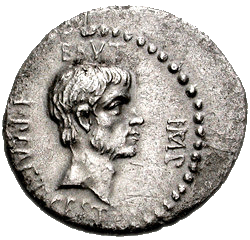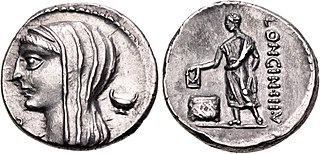Related Research Articles

The censor was a magistrate in ancient Rome who was responsible for maintaining the census, supervising public morality, and overseeing certain aspects of the government's finances.

Marcus Junius Brutus was a Roman politician, orator, and the most famous of the assassins of Julius Caesar. After being adopted by a relative, he used the name Quintus Servilius Caepio Brutus, which was retained as his legal name. He is often referred to simply as Brutus.

Clodia, nicknamed Quadrantaria, Nola, Medea Palatina by Cicero, and occasionally referred to in scholarship as Clodia Metelli, was one of three known daughters of the ancient Roman patrician Appius Claudius Pulcher.
Publius Clodius Pulcher was a populist Roman politician and street agitator during the time of the First Triumvirate. One of the most colourful personalities of his era, Clodius was descended from the aristocratic Claudia gens, one of Rome's oldest and noblest patrician families, but he contrived to be adopted by an obscure plebeian, so that he could be elected tribune of the plebs. During his term of office, he pushed through an ambitious legislative program, including a grain dole; but he is chiefly remembered for his long-running feuds with political opponents, particularly Cicero, whose writings offer antagonistic, detailed accounts and allegations concerning Clodius' political activities and scandalous lifestyle. Clodius was tried for the capital offence of sacrilege, following his intrusion on the women-only rites of the goddess Bona Dea, purportedly with the intention of seducing Caesar's wife Pompeia; his feud with Cicero led to Cicero's temporary exile; his feud with Milo ended in his own death at the hands of Milo's bodyguards.

The gens Claudia, sometimes written Clodia, was one of the most prominent patrician houses at ancient Rome. The gens traced its origin to the earliest days of the Roman Republic. The first of the Claudii to obtain the consulship was Appius Claudius Sabinus Regillensis, in 495 BC, and from that time its members frequently held the highest offices of the state, both under the Republic and in imperial times.

The gens Cassia was a Roman family of great antiquity. The earliest members of this gens appearing in history may have been patrician, but all those appearing in later times were plebeians. The first of the Cassii to obtain the consulship was Spurius Cassius Vecellinus, in 502 BC. He proposed the first agrarian law, for which he was charged with aspiring to make himself king, and put to death by the patrician nobility. The Cassii were amongst the most prominent families of the later Republic, and they frequently held high office, lasting well into imperial times. Among their namesakes are the Via Cassia, the road to Arretium, and the village of Cassianum Hirpinum, originally an estate belonging to one of this family in the country of the Hirpini.

Fulvia was an aristocratic Roman woman who lived during the Late Roman Republic. Fulvia's birth into an important political dynasty facilitated her relationships and, later on, marriages to Publius Clodius Pulcher, Gaius Scribonius Curio, and Mark Antony. All of these men would go on to lead increasingly promising political careers as populares, tribunes, and supporters of Julius Caesar.
Publius Cornelius Lentulus Sura was one of the chief figures in the Catilinarian conspiracy. He was also the step-father of the future triumvir Mark Antony.

Pro Caelio is a speech given on 4 April 56 BC, by the famed Roman orator Marcus Tullius Cicero in defence of Marcus Caelius Rufus, who had once been Cicero's student but more recently was a political rival. Cicero's reasons for defending Caelius are uncertain, but various theories have been postulated.
Marcus Caelius Rufus was an orator and politician in the late Roman Republic. He was born into a wealthy equestrian family from Interamnia Praetuttiorum (Teramo), on the central east coast of Italy. He is best known for his prosecution of Gaius Antonius Hybrida in 59 BC. He was also known for his trial for public violence in March 56 BC, when Cicero defended him in the extant speech Pro Caelio, and as both recipient and author of some of the best-written letters in the ad Familiares corpus of Cicero's extant correspondence. He may be the Rufus named in the poems of Catullus.

The gens Junia was one of the most celebrated families of ancient Rome. The gens may originally have been patrician, and was already prominent in the last days of the Roman monarchy. Lucius Junius Brutus was the nephew of Lucius Tarquinius Superbus, the seventh and last King of Rome, and on the expulsion of Tarquin in 509 BC, he became one of the first consuls of the Roman Republic.
Appius Claudius Pulcher was a Roman noble, general and politician of the 1st century BC. He was the father of a number of renowned Romans, most notable: the infamous Clodius and Clodia.

The Lex Aelia et Fufia was established around the year 150 BC in the Roman Republic. The presumed subject of this legislation was the extension of the right of obnuntiatio, that is, reporting unfavorably concerning the omens observed at the Legislative Assemblies, thus forcing an end to public business until the next lawful day. This right, previously reserved to the College of Augurs, was extended to all of the magistrates, thus denying a key political advantage to politicians who were members of that College. This law was repealed in 58 BC by the Leges Clodiae.
Quintus Caecilius Metellus Celer, a member of the powerful Caecilius Metellus family who were at their zenith during Celer's lifetime. A son of Quintus Caecilius Metellus Nepos, or, according to some, the son of tribune Quintus Caecilius Metellus Celer while the latter is the son of Quintus Caecilius Metellus Nepos, was an ancient Roman statesman and general during the First Century BC. He became consul in 60 BC and previously he held the offices of praetor and augur.

The history of the Constitution of the Roman Republic is a study of the ancient Roman Republic that traces the progression of Roman political development from the founding of the Roman Republic in 509 BC until the founding of the Roman Empire in 27 BC. The constitutional history of the Roman Republic can be divided into five phases. The first phase began with the revolution which overthrew the Roman Kingdom in 509 BC, and the final phase ended with the revolution which overthrew the Roman Republic, and thus created the Roman Empire, in 27 BC. Throughout the history of the Republic, the constitutional evolution was driven by the struggle between the aristocracy and the ordinary citizens.
Lex Caecilia De Censoria was passed by Metellus Scipio, Roman Consul of 52 BC. It repealed a law passed by the tribune Publius Clodius Pulcher in 58 BC, which had prescribed certain rules for the Censors in exercising their functions as inspectors of public morals (mores). It also required the concurrence of both Censors to inflict the nota censoria. During the census, the Censors could place a nota next to the name of a citizen, usually for offenses such as bankruptcy, cowardice, or having been a gladiator. If a citizen had a nota placed besides his name, he was subject to a range of penalties, including fines, exile, assignment to an inferior tribe for voting purposes, or even the loss of his citizenship. Thus, by requiring concurrence for the placement of a nota, this law placed an additional check on the powers of the Censors. This was typically the only act that required the concurrence of both Censors. Also, when a senator had been already convicted before an ordinary court, this law permitted the Censors to remove him from the senate in a summary way.
Caecilia Metella was a Roman matron of the first century BC, who belonged to the powerful family of the Caecilii Metelli. She was possibly the mother of Clodius.
The gens Fufia was a plebeian family at ancient Rome. The gens does not appear to have been of great antiquity, and only appears in history toward the beginning of the first century BC.
Imperium: The Cicero Plays is a stage adaptation of the Cicero trilogy of novels by Robert Harris. It was premiered by the Royal Shakespeare Company at the Swan Theatre in Stratford-upon-Avon from 16 November 2017 to 10 February 2018, directed by Gregory Doran and with Richard McCabe as Cicero. It played at the Gielgud Theatre in London from 14 June to 8 September 2018.

The lex Pompeia de ambitu was a law of the Roman Republic, passed in 52 BCE, aimed at prosecuting bribery and corruption in elections. It was proposed and enacted by Pompey the Great, who used it to prosecute and exile his political enemies.
References
- ↑ Dion Cassius. XXXVIII.13; Cic. in Vatin. 17, in Pison. 4, 5
- ↑ Dion Cassius XL.57, XXXVIII.13
- ↑ Cicero pro Sestio, 25; Dig. 50 tit. 16 s203 De Portorio
- ↑ Pro Domo, 18, &c., Post Redit. in Sen. 2.5, &c.
- ↑ Dion Cassius. XXXVIII.14
- ↑ Dion Cassius. XXXVIII.13
- ↑ Cicero pro Domo, 10
- ↑ Cicero. in Pis. 4, pro Sest. 25, ad Att. III.15
- ↑ Dion Cassius. XXXVIII.13
- ↑ Cicero. pro Mil. 12, 33
- ↑ Velleius Paterculus II.45
- ↑ Cicero. pro Dom. 8, 20, pro Sest. 26
- ↑ Dion Cassius. XXXVIII.30
- ↑ Plutarch Cat. Min. 34